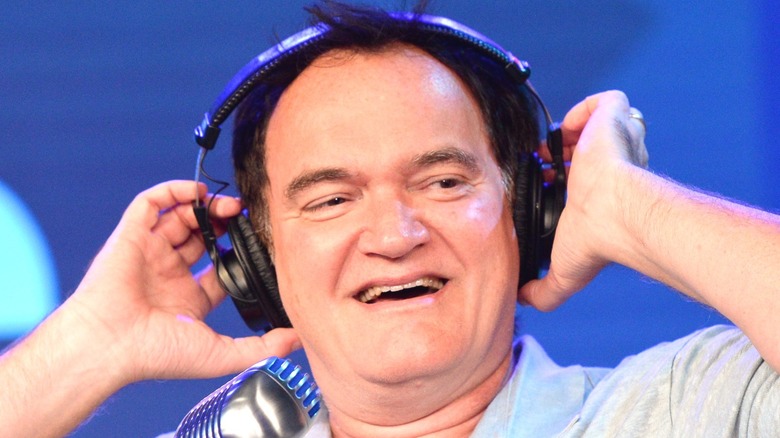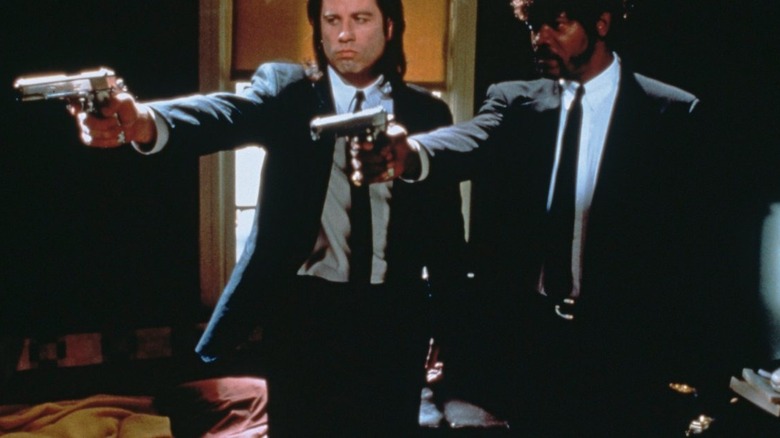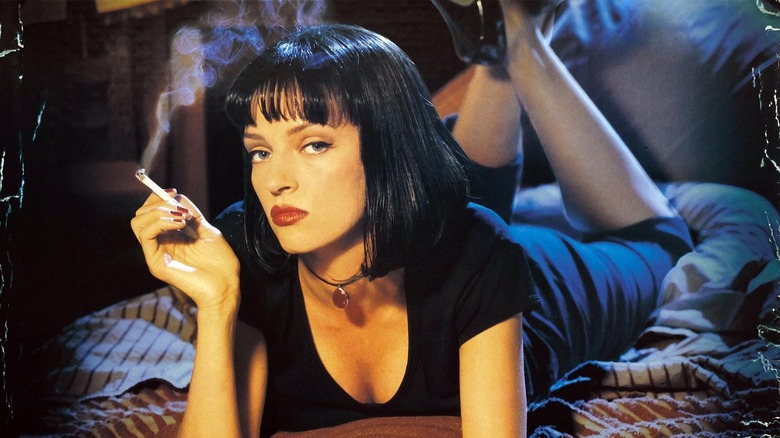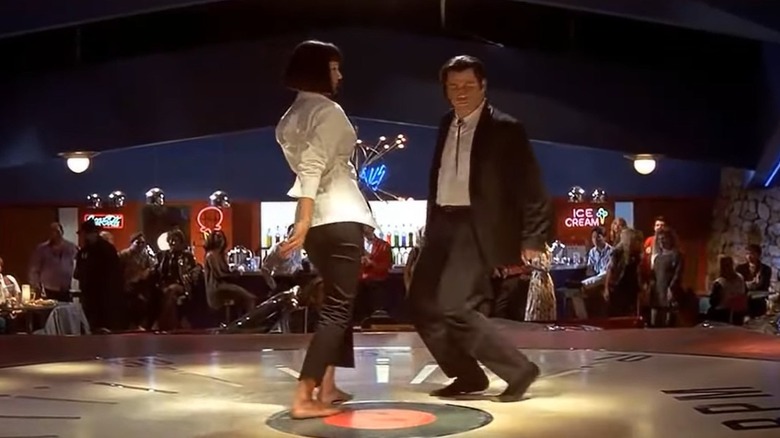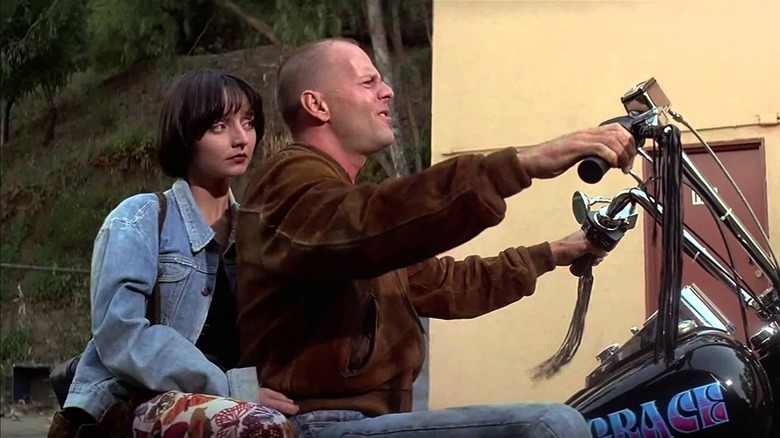In Quentin Tarantino's Directorial Career, One Movie Stands Above The Rest
As one of Hollywood's most prestigious filmmakers, it seems as if Quentin Tarantino never ceases to please. Though every Tarantino fan has their own personal ranking for their favorite films, you'd be hard pressed to find someone who feels that any of his movies lack their own unique identity. Even Tarantino's worst creations warrant serious consideration simply based on the auteur's reputation, and armchair critics have been more than serious about why they love certain movies more than others. Despite this, there is one consistency throughout the fanbase.
For all of the grandeur each Tarantino film bears on its own, it seems even he has his peaks. And after almost 30 years, it feels as though nothing the director creates can stand up to the legacy of 1994's "Pulp Fiction." It is simply the one movie that stands above the rest of his filmography. This might not be the biggest surprise, but rather than just marvel at how everybody loves "Pulp Fiction," it might be more constructive to take a serious look at why it stands at the top.
It has some of Tarantino's best writing
One consistent piece of praise given to "Pulp Fiction" is the quality of its dialogue. Heck, it even won an Oscar for Best Writing, and it's impossible to say that it wasn't well-deserved (via IMDb). Each character has a unique personality paired with a sharp kind of wit that constantly comes through in the way they talk. Even the slower, conversational scenes are as entertaining as the film's most tense moments. Sometimes, they are one and the same.
The character of Jules (Samuel L. Jackson), for instance, is a veritable goldmine of both smart one-liners and serious monologues. The first scene featuring him and Vincent Vega (John Travolta) alone shows the two going from friendly banter, to a serious discussion, to an brutal interrogation/assassination capped off by one of cinema's most intense monologues. No matter the situation, each character is written to feel as consistent and authentic as a real person (even if real people aren't all smooth-talkers).
It takes more than dialogue to sell a story, however. The story itself also has to be good, and in that regard "Pulp Fiction" still never fails to please. After enchanting viewers with each character through their dialogue, Tarantino weaves a complex spider web of character relationships and events that, while technically being a series of separate vignettes, feels utterly interconnected. For all its complexity, it is written in the most cohesive manner.
Tarantino's visual style is on point
In many ways, Tarantino is a filmmaker's filmmaker. He never lets a single aspect of the art go ignored, and he doesn't skimp on telling his story through visuals as much as his writing. Aside from having its fair share of iconic shots and sequences (from Jules' aforementioned speech to John Travolta's duet dance with Uma Thurman), the settings of each of its vignettes all feel unique. As long as they're paying attention, the viewer can't really get confused about where characters are and what they're doing there. This is especially amazing because of how the film's vignettes are staged non-linearly.
Also, if you thought that Tarantino's ability to characterize stopped at his dialogue, then you'd be dead wrong. Everything down to the way characters dress is constructed to sell this grimy image of the places and people in L.A.'s seedy underground. In a way, this gives the film itself its own character, one that helps keep the movie feeling consistent even as it jumps between space and time.
Critics near-universally love this film
It'd be inaccurate to say that film critics hold no sway over whether a film is generally considered good or bad. As such, critics are a big reason why people love "Pulp Fiction" so much. Almost every film publication regards this film very highly. Rotten Tomatoes' Tarantino ranking, which is based on the individual averaged review scores of various published reviews for each film, even has "Pulp Fiction" at the top. Looper even did the same thing in its own ranking. No matter which way you slice it, "Pulp Fiction" is one of the most critically praised films of all time — perhaps more so than any other Tarantino film.
As a result, people who look to film critics for guidance on which films are worth their time and money are more likely to regard "Pulp Fiction" just as highly. Given that "Pulp Fiction" has been popular with critics since its original release in 1992, there has never been a time where people didn't see it as one of the best films of all time.
Pulp Fiction still speaks to generations of movie fans
Despite the fact that "Pulp Fiction" probably deserves every bit of praise it receives, it'd be unfair to say that all of those good tidings have been objective criticisms. After almost 30 years, the people who remember seeing "Pulp Fiction" when it came out have fond memories of the film and how it has endured through the years. "Pulp Fiction" wasn't just good; it made Quentin Tarantino mainstream and introduced an entire generation to a new kind of movie (via Variety). At this point it is part of pop culture, and is therefore tied to many people's identities in ways large and small.
The love for that film gets passed down generations as people continually introduce it in a positive light to young moviegoers. By now, multiple generations have been raised with "Pulp Fiction" as an example of what good movies should look like. While this might not be an inaccurate judgement, it is hardly the most objective way to establish an opinion on any work of art. Regardless, the nostalgia power "Pulp Fiction" has as a pop culture icon means that every other Tarantino film has had an uphill climb for respect when compared to the filmmaker's generation-defining masterpiece.
